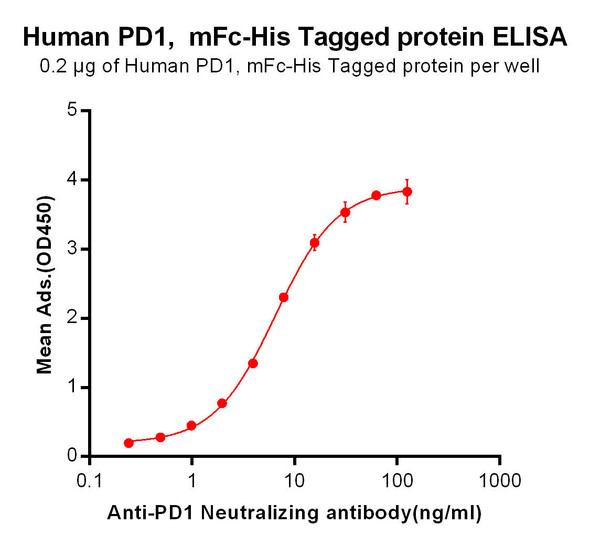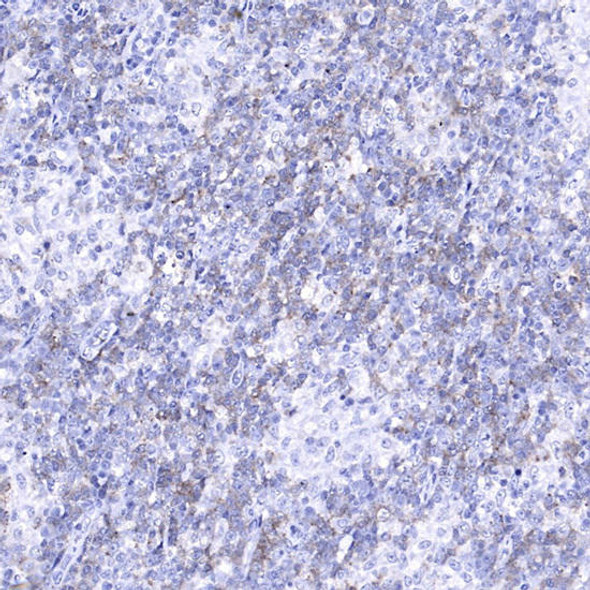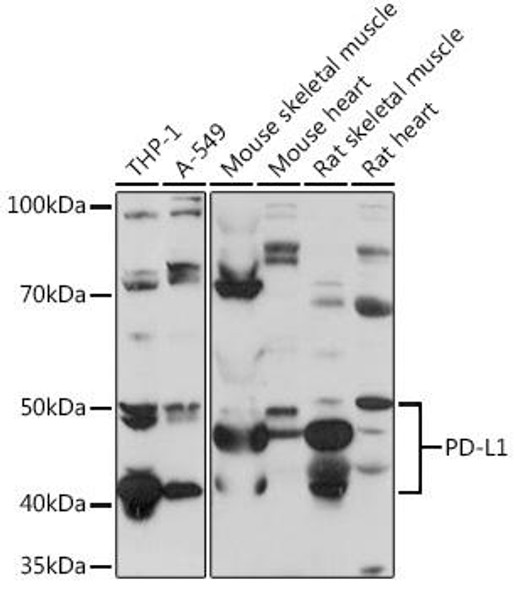Immunology Antibodies 2
Anti-PD-1 Antibody (CAB5584)
- SKU:
- CAB5584
- Product Type:
- Antibody
- Reactivity:
- Human
- Reactivity:
- Mouse
- Reactivity:
- Rat
- Host Species:
- Rabbit
- Isotype:
- IgG
- Antibody Type:
- Polyclonal Antibody
- Research Area:
- Immunology
Description
| Antibody Name: | Anti-PD-1 Antibody |
| Antibody SKU: | CAB5584 |
| Antibody Size: | 20µL, 50µL |
| Application: | WB |
| Reactivity: | Human, Mouse, Rat |
| Host Species: | Rabbit |
| Immunogen: | Recombinant fusion protein containing a sequence corresponding to amino acids 21-170 of human PD-1 (NP_005009.2). |
| Application: | WB |
| Recommended Dilution: | WB 1:500 - 1:2000 |
| Reactivity: | Human, Mouse, Rat |
| Positive Samples: | Raji, Mouse spleen, Mouse thymus, Rat thymus |
| Immunogen: | Recombinant fusion protein containing a sequence corresponding to amino acids 21-170 of human PD-1 (NP_005009.2). |
| Purification Method: | Affinity purification |
| Storage Buffer: | Store at -20'C. Avoid freeze / thaw cycles. Buffer: PBS with 0.02% sodium azide, 50% glycerol, pH7.3. |
| Isotype: | IgG |
| Sequence: | PGWF LDSP DRPW NPPT FSPA LLVV TEGD NATF TCSF SNTS ESFV LNWY RMSP SNQT DKLA AFPE DRSQ PGQD CRFR VTQL PNGR DFHM SVVR ARRN DSGT YLCG AISL APKA QIKE SLRA ELRV TERR AEVP TAHP SPSP RPAG QFQT LV |
| Gene ID: | 5133 |
| Uniprot: | Q15116 |
| Cellular Location: | Membrane, Single-pass type I membrane protein |
| Calculated MW: | 31kDa |
| Observed MW: | 42-70kDa |
| Synonyms: | PDCD1, CD279, PD-1, PD1, SLEB2, hPD-1, hPD-l, hSLE1 |
| Background: | This gene encodes a cell surface membrane protein of the immunoglobulin superfamily. This protein is expressed in pro-B-cells and is thought to play a role in their differentiation. In mice, expression of this gene is induced in the thymus when anti-CD3 antibodies are injected and large numbers of thymocytes undergo apoptosis. Mice deficient for this gene bred on a BALB/c background developed dilated cardiomyopathy and died from congestive heart failure. These studies suggest that this gene product may also be important in T cell function and contribute to the prevention of autoimmune diseases. |
| UniProt Protein Function: | Inhibitory cell surface receptor involved in the regulation of T-cell function during immunity and tolerance. Upon ligand binding, inhibits T-cell effector functions in an antigen-specific manner. Possible cell death inducer, in association with other factors. |
| NCBI Summary: | This gene encodes a cell surface membrane protein of the immunoglobulin superfamily. This protein is expressed in pro-B-cells and is thought to play a role in their differentiation. In mice, expression of this gene is induced in the thymus when anti-CD3 antibodies are injected and large numbers of thymocytes undergo apoptosis. Mice deficient for this gene bred on a BALB/c background developed dilated cardiomyopathy and died from congestive heart failure. These studies suggest that this gene product may also be important in T cell function and contribute to the prevention of autoimmune diseases. [provided by RefSeq, Jul 2008] |
| UniProt Code: | Q15116 |
| NCBI GenInfo Identifier: | 145559515 |
| NCBI Gene ID: | 5133 |
| NCBI Accession: | Q15116.3 |
| UniProt Secondary Accession: | Q15116,Q02242, |
| UniProt Related Accession: | Q15116 |
| Molecular Weight: | |
| NCBI Full Name: | Programmed cell death protein 1 |
| NCBI Synonym Full Names: | programmed cell death 1 |
| NCBI Official Symbol: | PDCD1 |
| NCBI Official Synonym Symbols: | PD1; PD-1; CD279; SLEB2; hPD-1; hPD-l; hSLE1 |
| NCBI Protein Information: | programmed cell death protein 1 |
| UniProt Protein Name: | Programmed cell death protein 1 |
| UniProt Synonym Protein Names: | CD_antigen: CD279 |
| UniProt Gene Name: | PDCD1 |
View AllClose






